G.Skill Phoenix Blade (480GB) PCIe SSD Review
by Kristian Vättö on December 12, 2014 9:02 AM ESTRandom Read/Write Speed
The four corners of SSD performance are as follows: random read, random write, sequential read and sequential write speed. Random accesses are generally small in size, while sequential accesses tend to be larger and thus we have the four Iometer tests we use in all of our reviews.
Our first test writes 4KB in a completely random pattern over an 8GB space of the drive to simulate the sort of random access that you'd see on an OS drive (even this is more stressful than a normal desktop user would see). We perform three concurrent IOs and run the test for 3 minutes. The results reported are in average MB/s over the entire time.
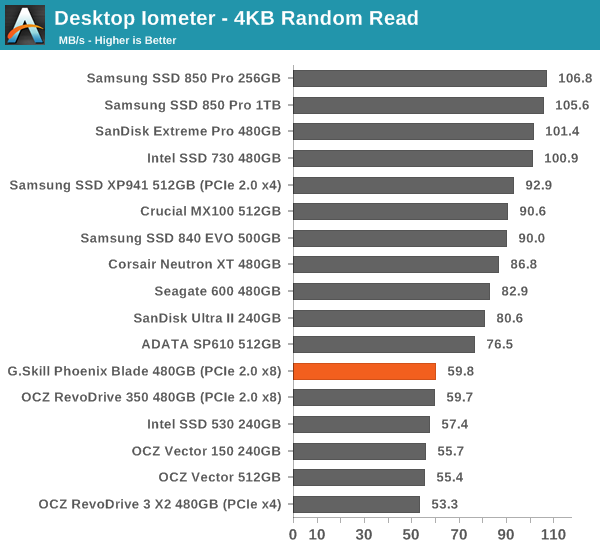
Random read speed is typical SandForce, which makes sense because the performance doesn't scale across multiple controllers at such low queue depths (QD=3 in this case).
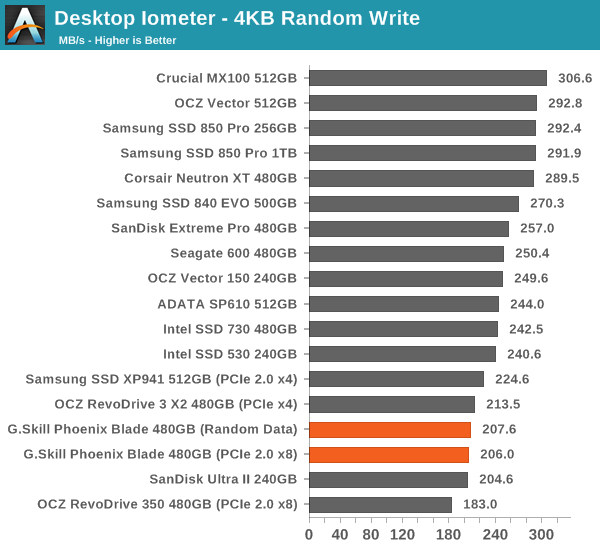
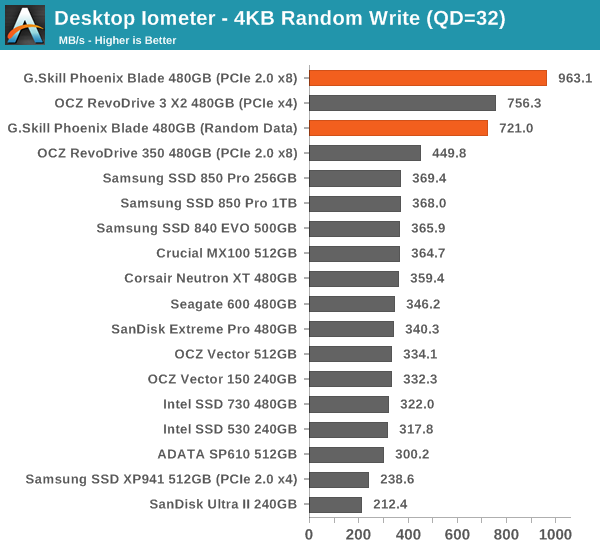
The same goes for random write performance at queue depth of 3, which isn't very high but is normal for SandForce based drives. However, the Phoenix Blade scales brilliantly with the queue depth and is considerably faster than the XP941 or RevoDrive 350.
Sequential Read/Write Speed
To measure sequential performance we run a 1 minute long 128KB sequential test over the entire span of the drive at a queue depth of 1. The results reported are in average MB/s over the entire test length.
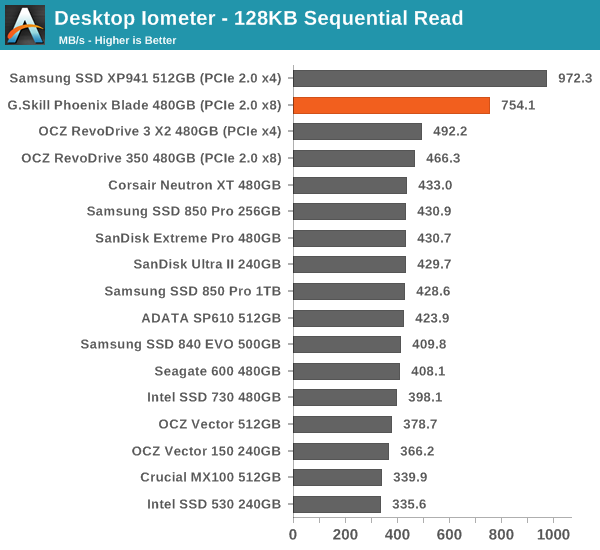
Sequential performance is also excellent, although the XP941 enjoys a slight advantage in sequential read performance. Overall the Phoenix Blade seems to be well optimized for parallelism -- much better than the RevoDrive 350 -- as it's able to provide substantially higher performance than SATA drives.
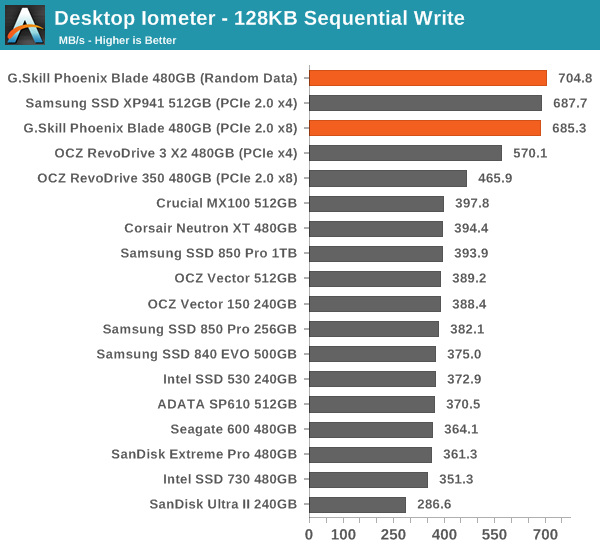
AS-SSD Incompressible Sequential Read/Write Performance
The AS-SSD sequential benchmark uses incompressible data for all of its transfers. The result is a pretty big reduction in sequential write speed on SandForce based controllers, but most other controllers are unaffected.
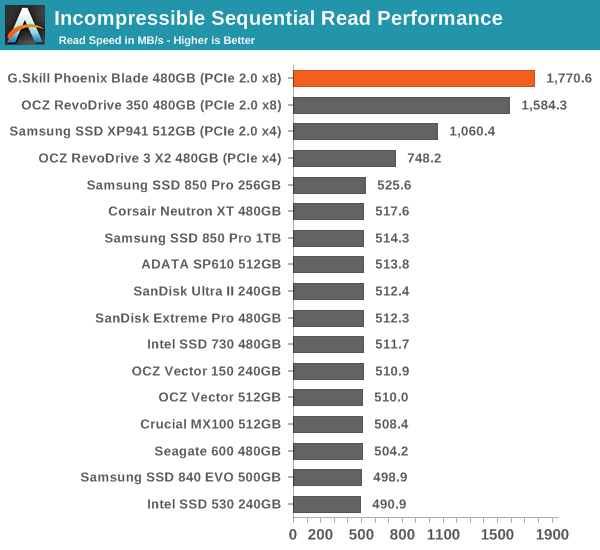
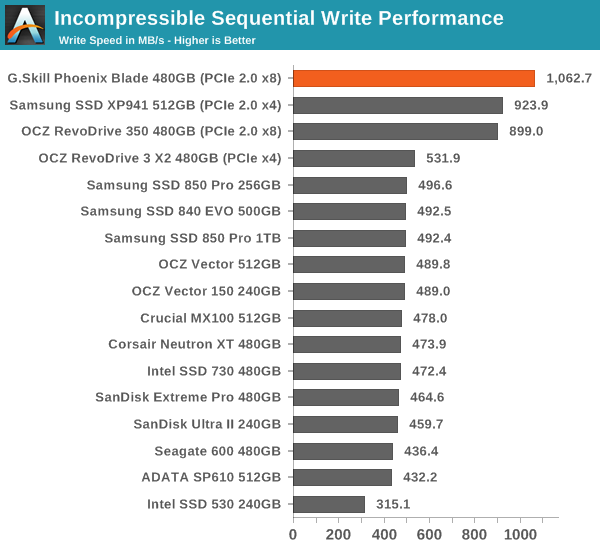










62 Comments
View All Comments
personne - Friday, December 12, 2014 - link
Oh nice, how did I miss that? Must have been thinking of another site. Thanks.vLsL2VnDmWjoTByaVLxb - Friday, December 12, 2014 - link
"there is a market in users with older motherboards for whom the XP941 is simply not an option due to the lack of boot support."Presumably an enthusiast or one in the higher-end workstation markets would already have a suitable boot device so I don't see this as a hindrance. This is already a high-end product, so buying a motherboard to fit the niche would be expected.
Kinda like you don't bemoan a high-power GPU for it's inability to work on low-power supply systems.
Kristian Vättö - Friday, December 12, 2014 - link
I'm not sure I agree with this. Many enthusiasts/professionals haven't seen the appeal to upgrade from Sandy/Ivy Bridge setups, so it's not just the motherboard that needs to be updated.DanNeely - Friday, December 12, 2014 - link
I definitely don't agree with it. The only reason I'm planning to replace the core of my even older i7-930 system is that it's gotten old enough that an old age failure is becoming more likely and I don't want to do a rush upgrade when something catastrophically fails.hojnikb - Friday, December 12, 2014 - link
And i'm just here, expection a native pci-e solution.... Damn, raid0 sandforce is really annoying. Atleast use a proper controller, like marvell.And trim still doesn't seem to work properly...
UltraWide - Friday, December 12, 2014 - link
Would it be more prudent to wait for an NVMe based PCIe SSD? Maybe the Intel DC P3500 that is about to start selling in the next few weeks?Kristian Vättö - Friday, December 12, 2014 - link
I thought about mentioning the P3500, but it's been "about to start selling in the next few weeks" for the past six months, so I decided not to mention it since there is still no real schedule for its release.Luke212 - Friday, December 12, 2014 - link
Kristian why does noone bother to bench to P3600? I only need read performance and the P3600 might be suitable. its cutting edge tech yet noone has bothered to review it!Kristian Vättö - Saturday, December 13, 2014 - link
Intel hasn't sampled media with the P3600, that's why.otherwise - Monday, December 15, 2014 - link
I too have been waiting for this drive, but considering it was pulled from Intel's website, I don't think we're going to see it. I am going to guess that Intel though it would completely cannibalize P3600 sales, which it probably will if it sees the light of day.